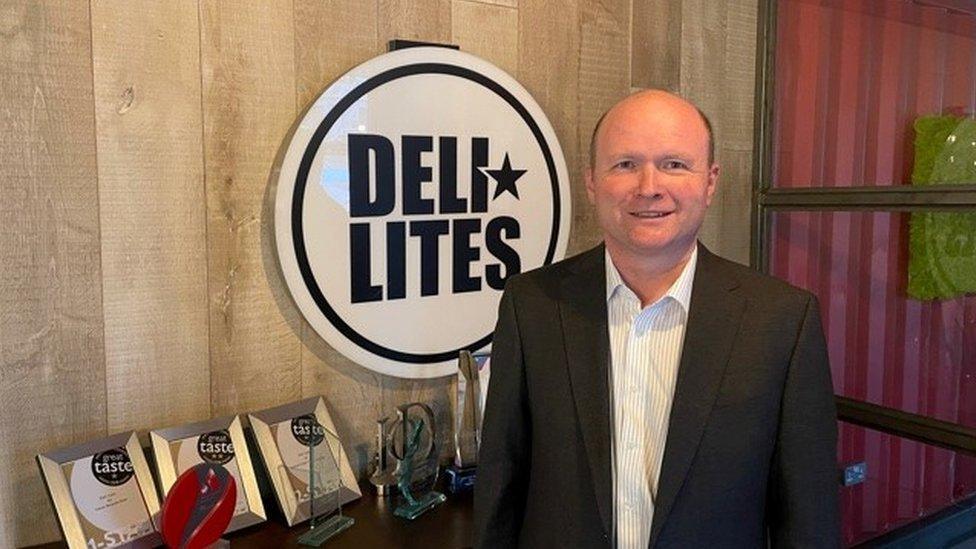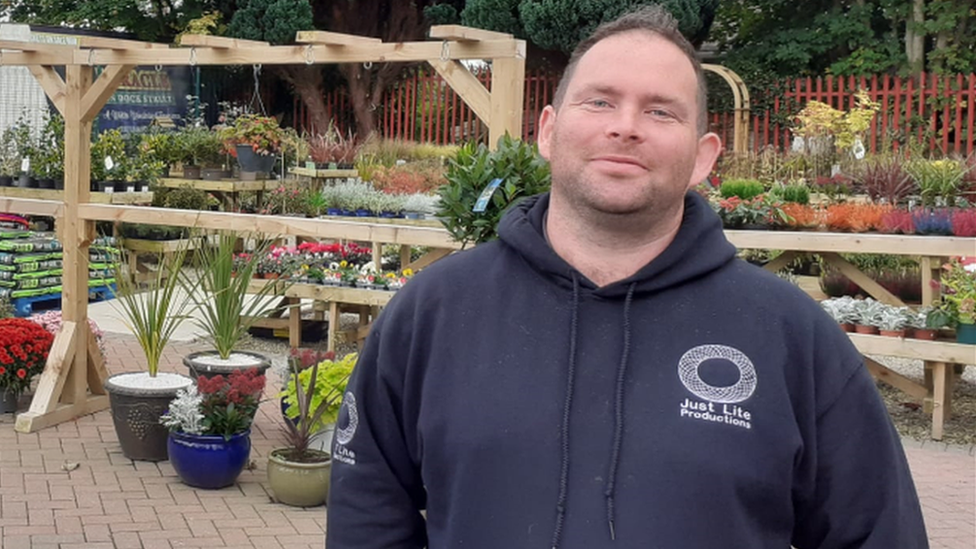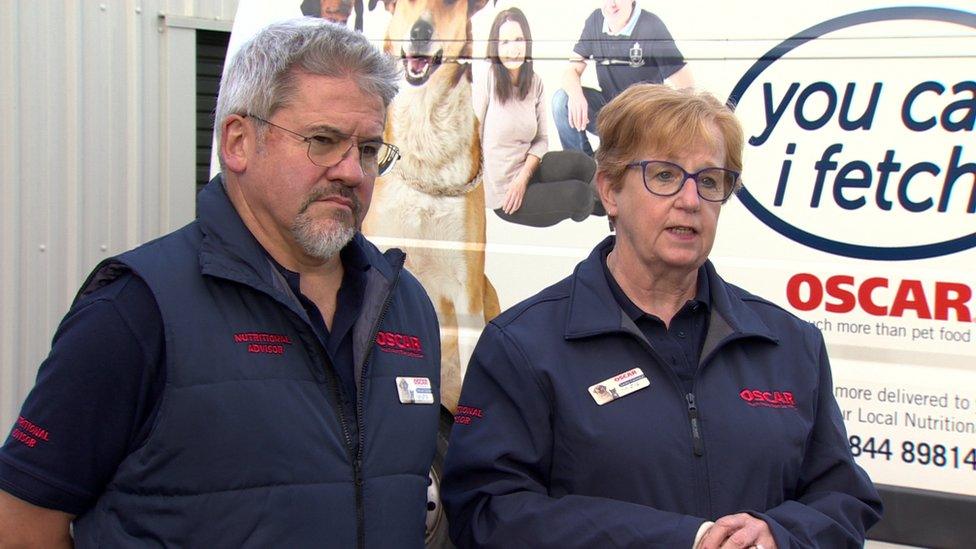Brexit: Northern Ireland firms give their verdict on the protocol
- Published

Graffiti in the loyalist Sandy row area of Belfast. Unionists say businesses in NI are being affected by the Irish Sea trade border
The European Commission will later bring forward its much-anticipated proposals for resolving problems with the Northern Ireland Protocol.
The protocol is the special Brexit deal agreed in 2019 to avoid a hard border on the island of Ireland.
It keeps Northern Ireland in the EU's single market for goods, but that creates a trade border for some products travelling between Great Britain and Northern Ireland.
Unionists say this undermines their place in the UK, but also creates fundamental problems for Northern Ireland firms.
BBC News NI has spoken to a number of businesses across Northern Ireland which say they have been affected by the protocol.

'We've had to say goodbye to about 20 different suppliers'

Andrew Lynas, of Lynas Foodservice, says scrapping the Northern Ireland Protocol is not the answer, but solutions are needed
Andrew Lynas - Lynas Foodservice, County Londonderry
The Coleraine-base company says it has had to employ two people to specifically deal with protocol-related paperwork as well as find alternative suppliers.
It delivers to more than 5,000 catering customers across the UK and Ireland.
Mr Lynas believes labour shortages, particularly with Heavy Goods Vehicle (HGV) drivers in Great Britain, means many businesses in England, Scotland and Wales may "cut their losses" and reduce trade with businesses in Northern Ireland.
"We've probably had to say goodbye to about 20 different suppliers, " he says.
"We've been able to find some alternatives on the island, and some in Europe but for some we haven't been able to find alternatives.
"There's just a lot of hassle and complexity and when you talk to a supplier in GB, they don't fully understand all the bits of that paperwork."
Mr Lynas believes scrapping the Northern Ireland Protocol "isn't the answer" but says a workable solution needs to be found.

'We do see opportunities, but have had problems'

Eamon McKey, chief operating officer with Deli Lites, says the protocol has produced opportunities and challenges
Eamon McKey - Deli Lites, County Down
Eamon McKey, chief operating officer with County Down-based Deli Lites, says 70% of its business is delivered to the Republic of Ireland, and the prospect of a hard border on the island was the company's "greatest concern".
He says the protocol has produced new opportunities for the firm.
"We welcomed the protocol as resolving the land border issue for us," he says.
He says he believes more people are now shopping locally, and Deli Lites has won a number of accounts that were previously serviced by competitors in Great Britain.
However, challenges include a loss of some of the firm's suppliers in Great Britain.
"There are ongoing threats to our GB supply chain," he says.
Mr McKey says that, on one occasion, one of its suppliers lost "valuable" produce because of delays due to temperature checks during shipping.
"This has impacted on our service to our customer and we are waiting on a replacement delivery," he adds.
"That type of incident is likely to further restrict GB supply into Northern Ireland. We do see opportunities, but we also have had problems."

'There are less trees available and the price has gone up'

John McGuinness, Garden Depot, County Tyrone, says he's had trouble getting Christmas tree supplies
John McGuinness - Garden Depot, County Tyrone
The Strabane-based garden firm is struggling to stock Christmas trees for the upcoming festive season.
Mr McGuiness sells about 600 Christmas trees each December, the majority of which in previous pre-Brexit years have been sourced from suppliers in Scotland.
But that's not the case this year.
Mr McGuinness says trees coming from Great Britain are now subject to "protocols, customs and paperwork" that complicates a process that had worked well before the UK and EU parted ways.
A product like Christmas trees have a limited shelf life, he says, and any process that delays their delivery is not good for business.
"You only have a certain amount of time from when you cut a tree until it gets to someone's house and before it dies, so all of that has to be taken into consideration," he says.
Larger stores than his that also sell trees are in a similar position, he adds, and businesses are looking to get trees from local suppliers.
That means "there's less trees available and the price has gone up as well", he says.
"I think we will get them, maybe not all the quantity, or all the different sizes that we would normally get, but we will be grateful to get what we do get."

'Our shipping costs have more than doubled'

Michael and Lesley Cairnduff of Oscar Pet Foods say they've experienced increased red tape
Michael and Lesley Cairnduff - Oscar Pet Foods, County Down
The Cairnduffs are the local nutritional advisers for Oscar Pet Foods in County Down, and have been providing a home delivery service for pet food and supplies for more than 25 years.
The company's head office is in Lancashire.
Mrs Cairnduff says their shipping costs have more than doubled in the first six months of this year compared to the same period in 2020.
"The first six months of this year were extremely worrying," says her husband.
He says the amount of administration time that head office now spends on Northern Ireland has increased by a factor of 50.
"For us here, it's gone up, our delivery work, the paperwork and red tape, by a factor of about 10. Obviously we'd prefer to spend that on customer service and marketing, and not using it for the Northern Ireland Protocol," he adds.
Mrs Cairnduff says food pallets coming from England are now taking 10-12 days, whereas it would have taken about four days pre-Brexit.
She says the EU should repurpose the trusted trader scheme,, external as they can prove they don't sell any of their produce on to the EU.
"If that was put in place, it would make life a lot simpler for us. Treat us the same as our counterparts in England are being treated," she says.